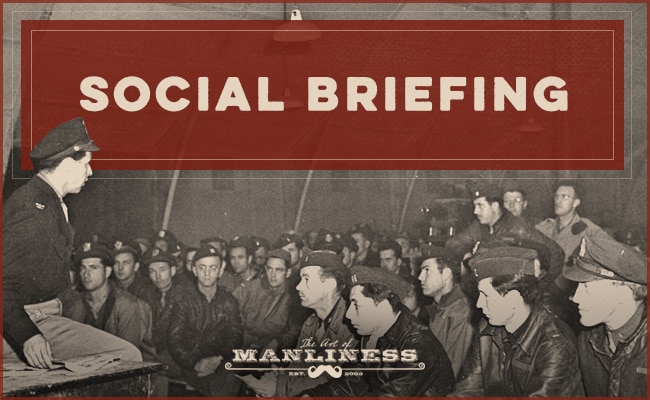
Social Briefings are short bi-monthly dispatches that offer practical tips to improve your social skills. Read more on their raison d’etre.
In these first Social Briefings, we’ve been presenting two questions/thought-starters designed to help you think through whether your current social style is one you’d like to keep or change.
Last time, we asked whether your old social patterns were still working for you, and talked about the fact that we sometimes pick up social habits that made sense for us at a certain point in our lives, but may no longer do so with where we’re at now.
Today’s question for consideration is this:
Do others see you differently than you see yourself?
Whether your social behaviors are something you developed because of the circumstances of a certain phase of your life, or something that’s been ingrained in your DNA since birth, how we think these proclivities are perceived by others, may be a lot different than how they actually are.
Below you’ll find a table that shows common behaviors you might engage in when interacting with others, how you may think they come off, and how they might actually be interpreted by other people. These are taken (with permission) from First Impressions: What You Don’t Know About How Others See You; you can find even more examples in the tables available on their website.
| If You Do This | You May Think You Seem | You May Seem |
|---|---|---|
| Share what’s on your mind before basic personal information | Interesting and offbeat | Self-centered, eccentric, inappropriate |
| Show little attention to your grooming and style | Natural, not concerned with superficialities | Socially unaware, careless |
| Withhold attention or interest | Cool and confident | Uninterested, rejecting, cold |
| Listen, but don’t add topics to the conversation | Interested, thoughtful | Dull, self-involved |
| Focus on only one topic | Passionate | Boring, self-absorbed, lacking in curiosity |
| Deliver a lecture on something you know a lot about | Smart, interesting | Bombastic, boring, self-absorbed |
| Introduce topics with the goal of convincing others of your way of thinking | Enlightened, smart, passionate | Tedious, draining |
| Talk about “charged” topics such as salaries or religion | Passionate, interesting | Insensitive, offensive |
| Dominate the conversation with jokes and humor | Entertaining, lively, funny | Tedious, draining |
| Focus on your individuality rather than your commonality with others | Interesting, eccentric | Inaccessible, self-involved, socially awkward |
| Share more than others do | Open, honest, revealing | Burdensome, inappropriate |
| Share much less than others | In control, mysterious | Closed, uninteresting, cold |
| Speak more quickly and pause more briefly than others | Interesting, energized | Emotionally draining, alienating |
| Speak more slowly or pause longer than others | Relaxed, comfortable, thoughtful | Boring, tedious |
| Speak more loudly | Self-confident, fun, interesting | Bombastic, self-satisfied, offensive |
| Speak much more than others | Interesting, informative | Self-absorbed, difficult to connect with |
| Act inflexibly to unexpected events | Determined, appropriately demanding | Needy, entitled, high maintenance |
| Present yourself as superior to others | Important, impressive | Intimidating, insecure |
| Present yourself as inferior to others | Modest, endearing | Awkward, lacking confidence |
| Blame others | Honest, straightforward | Difficult, socially needy, victimized |
| Focus on negative aspects of a situation | Straightforward, realistic | Unlikable, unpleasant |
| Make less eye contact than others | Normal, respectful | Rejecting, uninterested, shy, awkward |
The key word in these examples is may. Some of these behaviors may in fact work just as you think they do, and be winning in certain situations, with certain people, and in the context of your overall personality.
So too, even if they’re not working in the way you think they are, you may not wish to alter them because you feel they’re an important expression of your real self.
As the authors of First Impressions put it, the point of this self-examination exercise, then, is simply to “identify gaps between how you think you come across and how others actually perceive you, so you can make changes if you want to and when you want to [emphasis mine].”
Improving your social skills isn’t about trying to be someone you’re not, but making sure that other people perceive you in the way you want be perceived — making sure that the impression you make presents your best qualities and is more accurate, not less.
It is very commonly the case that your social behaviors do come off differently than you realize — in a way that’s at odds with your true personality and desires, and disguise rather than reveal what you’re really like. In such cases, it behooves you to tweak those habits so that you present yourself in a more positive and authentic way.
Many of the future Social Briefings we’ll put out will help you do just that.

